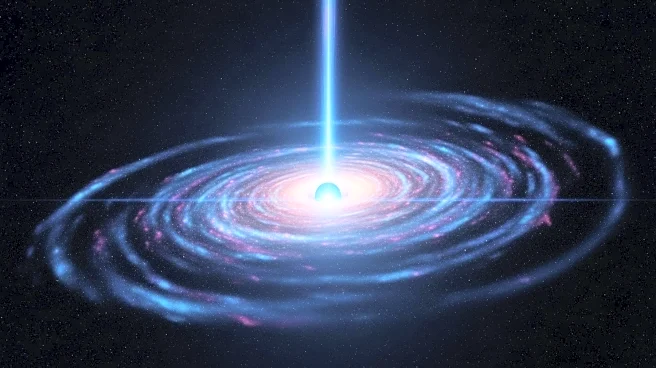What's Happening?
A team of astronomers led by Dr. AN Tao from the Shanghai Astronomical Observatory has discovered a rogue black hole in a dwarf galaxy located approximately 230 million light-years away. This black hole is unique because it is not situated at the galactic center, but rather offset by nearly one kiloparsec, and is actively feeding and producing radio jets. The discovery, published in Science Bulletin, challenges the traditional view that black holes primarily reside at the centers of galaxies. The research suggests that black holes can grow and influence galaxies even when they are not centrally located, offering new insights into cosmic evolution.
Why It's Important?
This discovery is significant as it provides a new perspective on the growth of supermassive black holes, suggesting that they can develop rapidly outside of galactic centers. The findings imply that black holes can influence their host galaxies from the outskirts, potentially reshaping theories of galaxy formation and evolution. The study highlights the importance of dwarf galaxies as 'cosmic fossils' that preserve clues about early black hole growth. This could lead to a reevaluation of how black holes and galaxies co-evolve, impacting our understanding of the universe's history and structure.
What's Next?
The study opens up new avenues for research into wandering black holes, which may become more common with advancements in telescope technology. Future observations with next-generation optical and radio telescopes could provide higher precision measurements of galactic structures and detect fainter radio signals, potentially revealing more off-nuclear black holes. These developments could lead to breakthroughs in understanding the distribution and impact of black holes across the universe, transforming theoretical speculation into observable reality.
Beyond the Headlines
The discovery of wandering black holes challenges the conventional view of black hole growth and suggests that they may play a more dynamic role in shaping galaxies than previously thought. This could have implications for the study of galactic dynamics and star formation, as black holes inject energy into their surroundings through powerful outflows. The research underscores the need to reconsider the role of black holes in cosmic evolution, potentially leading to new models of galaxy formation.








